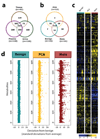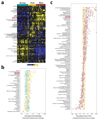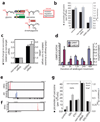Metabolomic profiles delineate potential role for sarcosine in prostate cancer progression
- PMID: 19212411
- PMCID: PMC2724746
- DOI: 10.1038/nature07762
Metabolomic profiles delineate potential role for sarcosine in prostate cancer progression
Erratum in
- Nature. 2013 Jul 25;499(7459):504
Abstract
Multiple, complex molecular events characterize cancer development and progression. Deciphering the molecular networks that distinguish organ-confined disease from metastatic disease may lead to the identification of critical biomarkers for cancer invasion and disease aggressiveness. Although gene and protein expression have been extensively profiled in human tumours, little is known about the global metabolomic alterations that characterize neoplastic progression. Using a combination of high-throughput liquid-and-gas-chromatography-based mass spectrometry, we profiled more than 1,126 metabolites across 262 clinical samples related to prostate cancer (42 tissues and 110 each of urine and plasma). These unbiased metabolomic profiles were able to distinguish benign prostate, clinically localized prostate cancer and metastatic disease. Sarcosine, an N-methyl derivative of the amino acid glycine, was identified as a differential metabolite that was highly increased during prostate cancer progression to metastasis and can be detected non-invasively in urine. Sarcosine levels were also increased in invasive prostate cancer cell lines relative to benign prostate epithelial cells. Knockdown of glycine-N-methyl transferase, the enzyme that generates sarcosine from glycine, attenuated prostate cancer invasion. Addition of exogenous sarcosine or knockdown of the enzyme that leads to sarcosine degradation, sarcosine dehydrogenase, induced an invasive phenotype in benign prostate epithelial cells. Androgen receptor and the ERG gene fusion product coordinately regulate components of the sarcosine pathway. Here, by profiling the metabolomic alterations of prostate cancer progression, we reveal sarcosine as a potentially important metabolic intermediary of cancer cell invasion and aggressivity.
Figures




Comment in
-
Diagnostics: The prostate-cancer metabolome.Nature. 2009 Feb 12;457(7231):799-800. doi: 10.1038/457799a. Nature. 2009. PMID: 19212391 No abstract available.
-
Findings of Research Misconduct.Fed Regist. 2013 Aug 6;78(151):47699. Fed Regist. 2013. PMID: 27737229 Free PMC article. No abstract available.
References
-
- Abate-Shen C, Shen MM. Molecular genetics of prostate cancer. Genes Dev. 2000;14:2410–2434. - PubMed
-
- Ruijter E, et al. Molecular genetics and epidemiology of prostate carcinoma. Endocr Rev. 1999;20:22–45. - PubMed
-
- Lawton KA, et al. Analysis of the adult human plasma metabolome. Pharmacogenomics. 2008;9:383–397. - PubMed
-
- Tomlins SA, et al. Integrative molecular concept modeling of prostate cancer progression. Nat Genet. 2007;39:41–51. - PubMed

